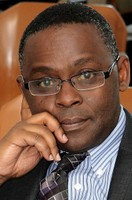 "Global green growth depends, in large measure, on our ability to build scientific capacity, especially in the developing world."
"Global green growth depends, in large measure, on our ability to build scientific capacity, especially in the developing world."
That's the message that Romain Murenzi, executive director of TWAS, conveyed at the 2011 Seoul Science and Technology Forum taking place in South Korea from 5 to 8 October. The conference is sponsored by the Korea Council of Fundamental Science and Technology, the Korea Institute of Science and Technology and the Science and Technology Policy Institute. More than 400 participants from 100 countries attend. The overarching theme of this year's conference is 'Global Green Growth: Identifying Needs and Sharing Expertise in S&T Development'.
"The ability to go green," Murenzi said," is directly related to the capacity to go green. Good intentions must be backed by formidable knowledge and skills, and this will require building a strong foundation in science and technology in all countries."
Murenzi added that this was especially true when it came to efforts to develop a sustainable energy future, the major theme of the conference and an issue that serves as a linchpin for larger efforts to create an effective blueprint for sustainable development.
For this reason, Murenzi urged participants at the conference to support efforts to expand graduate and postgraduate fellowships, especially in science, technology and engineering. He cited the example of the TWAS fellowship programme. The programme, which makes 300 fellowships available each year to young scientists from developing countries, operates in partnership with Brazil, China, India and a number of emerging economies.
"It is currently one of the world's largest South-South fellowship programmes," Murenzi noted. But "if we could increase the number of fellowships three-fold to offer 1,000 fellowships a year, we could truly have a dramatic impact on science and technology in the South."
"Thousands of well-trained scientists conducting research on critical sustainability issues and teaching thousands of students at the same time", he said, "would have a transformative impact on the developing world." Over time, it would provide a cadre of well-trained researchers dedicated to such crucial issues as energy security.
"The road to a sustainable future poses a formidable challenge", Murenzi noted. But the only way to ensure progress is to create a workforce with the knowledge and skills to meet these challenges, both now and in the future.
"Education is the key to a sustainable future," he observed, "and graduate and postgraduate training must be a key in overall educational efforts at the local, national and global levels."

